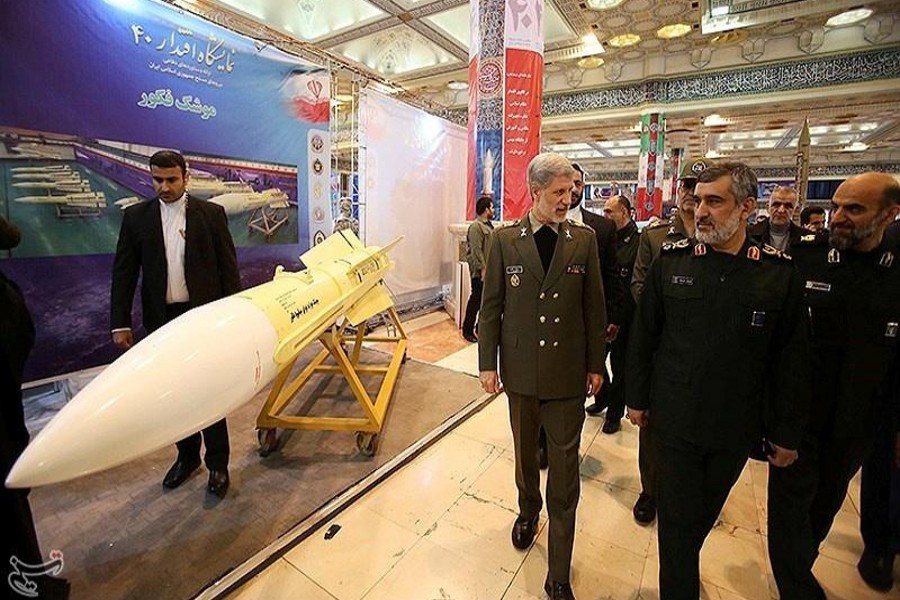Iran displayed a new cruise missile with a range of 1,300 km (800 miles) on Saturday during celebrations marking the anniversary of the 1979 Islamic Revolution, state television reported.
Iran has expanded its missile programme, particularly its ballistic missiles, in defiance of opposition from the United States and expressions of concern by European countries. Tehran says the programme is purely defensive.
Later on Saturday, a senior Revolutionary Guard commander suggested that pressure by European countries for talks on curbing Iran’s ballistic missiles development could prompt Tehran to expand it beyond current limits.
Speaking during the unveiling ceremony, Defence Minister Amir Hatami said: “This cruise missile needs a very short time for its preparedness and can fly at a low altitude.”
The surface-to-surface missile, named Hoveizeh, is from the Soumar family of cruise missiles, which Iran added to its arsenal in 2015, Hatami said.
Western experts say Iran often exaggerates its weapons capabilities, although there are concerns about its long-range ballistic missiles.
Amirali Hajizadeh, head of the Revolutionary Guard aerospace division, said Iran had overcome initial problems in producing jet engines for cruise missiles and could now manufacture a full range of the weapons.
The Defence Ministry’s website carried an undated video purportedly showing the Hoveizeh being test-fired from a mobile launcher. It quoted Hatami as saying the missile had successfully hit targets at a distance of 1,200 km.
Since agreeing to a 2015 nuclear deal with world powers, Iran has expanded its missile programme despite warnings from the United States.
In January, it tried to launch a satellite into space which it said failed. The launch followed a US warning to Iran against undertaking three planned rocket launches that Washington said would violate a United Nations Security Council resolution, according to Reuters news agency.
The resolution, which enshrined Iran’s nuclear deal, called upon Tehran to refrain for up to eight years from work on ballistic missiles designed to deliver nuclear weapons.
Iran says its missile tests are not in violation of the resolution and denies its missiles are capable of carrying nuclear warheads.
“STRATEGIC LEAP?”
Brigadier General Hossein Salami, deputy head of the elite Revolutionary Guard, reiterated Iran’s rejection of any talks on its missile programme, in response to a demand raised by France and other European countries, the semi-official news agency Fars reported.
France said last month it was ready to impose further sanctions on Iran if no progress was made in talks about the missiles, described by Tehran as defensive but seen in the West as a destabilising factor in a volatile region.
Salami said Iran’s decision to limit the range and the number of its ballistic missiles was based on its current strategy, which could change based on circumstances.
“If today the Europeans or others try to plot and pursue Iran’s missile disarmament, then we will be forced to resort to a strategic leap,” Fars cited Salami as saying, an apparent threat that Iran may seek to boost the range or the number of the missiles.
Last week, Iran dismissed the pressure from France for talks, but said it had no plans to increase the range of the weapons.
US President Donald Trump quit the Iran nuclear deal last year and reimposed sanctions on Tehran that had been lifted under the pact in return for Tehran curbing its nuclear programme.
Washington says although Iran has met the terms, the accord was too generous, failing to rein in Iran’s ballistic missile programme or curb what the United States says is interference in regional affairs.
Iran has developed a large domestic arms industry in the face of decades-long international sanctions and embargoes that have barred it from importing most weapons.


